Why fighting games are the purest form of multiplayer
So I’ve been playing a lot of Street Fighter again lately. Not just, you understand, in order to get back into training, so as to not be a flailing embarrassment at the recent Ultra Street Fighter IV preview events (though I’ll admit that the timing was a happy accident). No, you see beyond any professional face-saving measures, on a personal level I just needed Street Fighter back in my life. Something important has been missing from the office lunchtime gaming roster since the last time our regular fight club met. And that something is, in essence, the entire reason I play multiplayer games at all. In all my years of gaming, I’ve only found it in good fighting games. Because good fighting games, for me, are what multiplayer is really all about.
It sounds like a simple point, maybe even a trite one, but multiplayer gaming is all about human interaction. And nowhere else but in fighting games do I find that in its purest form. There a lot of great multiplayer games around, of course. But however good the online offerings of the various shooters that dominate the landscape, I always find something in their vital makeup that distracts or muddies the fundamental core of what I want when playing a game with other people.
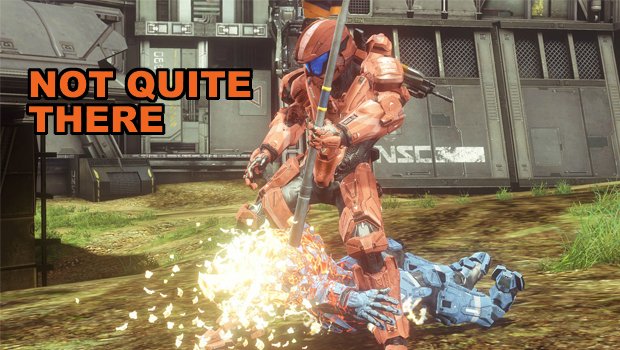
Call of Duty? Fast, visceral fun, but too reliant on twitch reactions and the disparity of unlockable weapons. Battlefield? I love its big-picture tactical game and emergent action-movie set-pieces, but there’s too much at play at any one given time for it to really deliver the purity I want. Halo? Probably my favourite console shooter, thanks to its strategic, moment-to-moment firefights and drawn-out pacing, but again there are too many random factors that get in the way of direct, player-to-player interaction.
Street Fighter though? Now we’re talking. It’s the total, unsullied focus on the players that does it for me. With its resolute, contained, one-on-one focus and total lack of extraneous factors affecting a match outcome--no faux self-improvement through the artificiality of weapon-grinding, no third-party kill-thieves waiting to get involved in the action from afar--a good fighting game is an experience made of and evolved by nothing more than pure player skill and interaction. It’s entirely about an individual player’s mastery of their character and the game’s overarching mechanics, and the way that the gameplay springing from that influences and evolves every step of the back-and-forth interplay of the fight. It’s as much a dialogue as it is a video game.
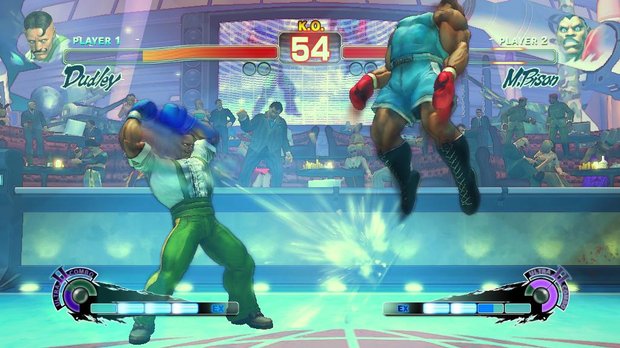
Yes, if you want to get pedantic about it, then the asymmetric gameplay afforded by different character match-ups does throw a kind of contrivance into the mix, but in a really good fighting game, one with the immaculate character balance of Street Fighter IV, that really isn’t a problem. In fact it’s only a bonus. If the fight is a dialogue, then the varying challenges and possibilities afforded by fighting a different character are the means through which to expand one’s vocabulary and command of grammar, and in some extreme cases even learn whole new languages.
If all of this is now sounding like a freewheeling ramble on human psychology and personal expression rather than a discussion of video games, that’s because it is. Or rather, it’s both. Because at their best, that stuff is what fighting games are about. You see there’s a reason that the most passionate fighting game players stick to one or two main characters at a time rather than jumping around the whole roster willy-nilly. That approach doesn’t limit their gameplay options. Rather, it opens up the real potential of the game on a level that less focused play never could. Because a fighting game character isn’t just another video game avatar, to be used and abused until you get bored and move onto another one. A fighting game ‘main’ is an extension of the player; a conduit through which for them to express their personality into the game.
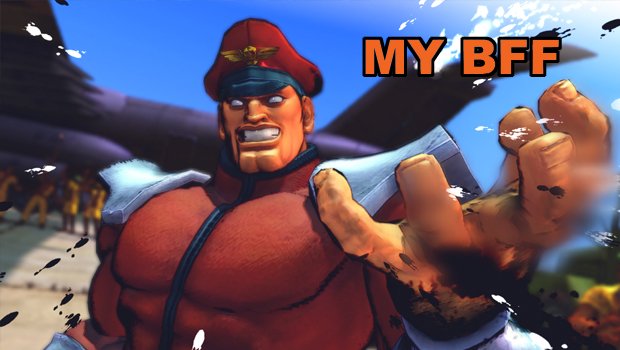
It works like this. You find a character who resonates with you in some way, who delivers the kind of gameplay that you find most fun and or who suits what seems to be your natural play-style. You stick with them, you learn their depths, test their strengths and weaknesses, and discover their nuances. But the thing is, a lot of those discoveries aren’t hard-coded or prescribed out of the box. Rather, the particular discoveries you make will be a product of the character’s possibilities focused through the lens of your own personality and predilections.
Weekly digests, tales from the communities you love, and more
My main is Bison. My Bison is pretty strong. He’s not tournament level by any means, but I love him dearly. Because I don’t just play Bison. I play my Bison. Just as everyone reading this has access to the complete selection of the words in the English dictionary, but speaks using a particular lexis, flow and voice unique to them, I have access to the same move-set, combos and options as any other Bison player, but I play Bison in a manner all of my own. Now, extrapolate this idea into all of the pure, expressive, conversational gameplay I was talking about above, and hopefully you’ll see what I’m talking about with this article.
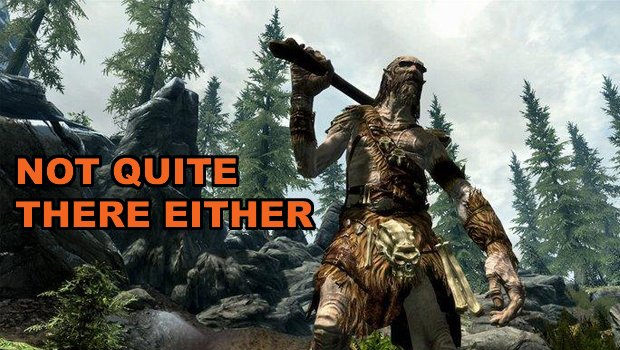
For all the extensive character customisation possibilities in RPGs like Skyrim and Fallout, fighting games, in their own way, offer a fuller, more organic option. If the game in question is as deep and open-ended as Street Fighter IV, then the simple act of bonding with a character and playing them long-term brings about an evolutionary, very personal strand of character customisation, as the electronic fighting man or woman of choice becomes not a set collection of moves and combos, but a custom hybrid of the developers’ work and the player’s personality. I could probably, legitimately, go into a pseudo-high-fallutin’ discussion of game avatars as an expression of the id here, but I won’t. Mainly because I play Bison, and I could do without a pre-Christmas weekend spent musing on my potential for latent psychopathic fascist tendencies.
When two players put their mains up against each other repeatedly, amazing things happen. Just as the characters played evolve as a result of those who are playing them, so too does the game itself continually change, fuelled solely by the input of those playing it. You’ll play for a while, then one of you will discover a new trick. You’ll hone it for a while and gain the upper hand. Then your opponent will, out of necessity, discover a counter and put you on the back foot. Then, a little while later, you’ll evolve your game again as the new situation forces you to learn and invent new situational possibilities for your character. You’ll recognise it every time it happens. Everything just comes into a sharper focus, the whole game feels bigger, and the future potential of the experience immediately explodes. It feels great.
And so it continues, until eventually you’re both playing a very different game to the one you started playing. And it’ll be one that you discover craft, subvert and rebuild between the two of you, every step of the way. And it will never, ever, be the product of anything other than the people playing it. Three quarters of my Bison’s current repertoire came into being this way, and I was learning new tricks as recently as last week.
If you play fighting games a lot, then I’m loudly bellowing at a vigorously nodding choir here. But if you don’t, if you’ve been at all intimidated by them, or just never found the opportunity to give them a go, please take a little bit of advice from me. Grab a copy of Street Fighter IV (any version will do), and sit down with it alongside a good friend. Play around a little, find characters who feel right, and then go at it in Vs. mode for as long as you possibly can. Don’t worry about who wins or loses. Like most worthwhile human interactions, fighting games are more about the journey and the ‘conversation’ than the ultimate conclusion. It’ll be scrappy at first, but don’t worry too much about improving or learning. That will just happen in due course.
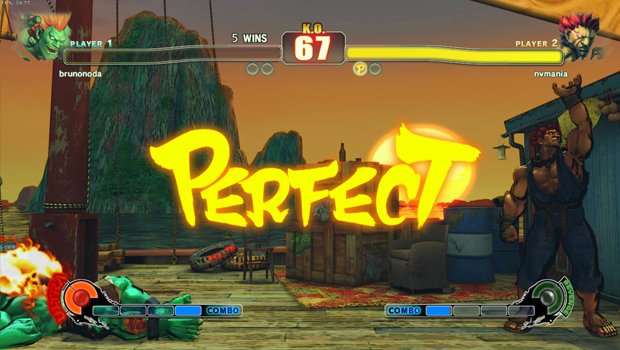
You see no-one really ‘learns’ how to play Street Fighter. They just keep playing it until new pathways open up in their brains and they start to make discoveries on instinct. Give it an hour or so, and you’ll both start becoming rather capable. Give it another couple of hours, and your characters will be completely alien to the ‘vanilla’ versions you started out with. Give it another couple of hours, and you’ll be playing a completely new game, unrecognisable from what you thought Street Fighter IV was when you first loaded it up.
Keep going, consider no other post-match option than ‘Rematch’, and in what feels like no time at all you’ll be swept up in one of the purest, most endlessly stimulating, and most utterly human experiences in gaming. You’ll realise that you made it all happen, and you’ll become rather proud and excited. And then you’ll hit ‘Rematch’ again. Because you and your buddy will always have new things to discover, build, and kick stoutly in the face.



